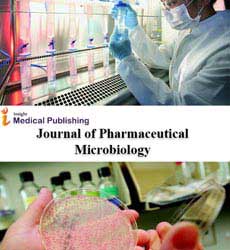Abstract
Phenotypic and genotypic characterization of antibiotic susceptibility in Salmonella Infantis strains isolated from chicken meats
Salmonella serovar Infantis (S. Infantis) is an important public health concern due to its frequent isolation from humans; it ranks in fourth position
among top-10 human serovars. It is frequently multidrug resistant (MDR). Most cases of salmonellosis in human does not require antimicrobials
for treatment, but severely invasive salmonellosis, which needs treatment with β -lactams and fluoroquinolones. We characterize, phenotypically
and genotypically, the antibiotics susceptibility of S. Infantis strains isolated from chicken meat for sale in supermarkets in the city of Santiago,
Chile. Samples of 361 fresh chicken meats from different supermarkets were taken and 85 strains of S. Infantis were isolated according to the
protocol of ISO 6579: 2002. Susceptibility was assessed using the agar plate disk diffusion method, according to the Clinical and Laboratory
Standards Institute M100-S23 (CLSI, 2013). Multidrug resistance (MRD) was defined as the resistance to three or more antimicrobial classes. The
resistant isolates, with a zone diameter less than or equal to the breakpoints for cefotaxime, ceftazidime, were also examined to identify ESBL
production, using the phenotypic confirmatory test (CLSI., 2014). The presence of genes associated with beta-lactams blaTEM, blaNDM1 and bla
CTX-M, fluoroquinolons qnrB, aminoglycosides aac (6) -Ib, tetracycline tet (A) and tet (B), trimethoprim dfrA1 was detected by PCR amplification.
Results: 95% were resistant to tetracyclin, 67% to ceftriazone, 66 to cefadroxil, 64% to ampicillin, 60% to ceftiofur, 46% to trimethoprim, 11%
to aminoglycosides, and 3% to fluoroquinolons. The prevalence of resistance genes was: 23% amplified for the bla CTX-M, 66.6% for qnrB
gene, 7% for tetA gene, 25.6% for tetB gene. 81% for aac (6) -Ib gene and 15% for dfrA1 gene. Conclusions: In our study, a high prevalence of S.
Infantis in chicken meat was observed, with antibiotic resistant strains, especially those of the B-lactam group, which is a threat to public health.
Author(s):
Lapierre L., Vergara E. C. and Cornejo J
Abstract | PDF
Share this

Google scholar citation report
Citations : 36
Journal of Pharmaceutical Microbiology received 36 citations as per google scholar report
Abstracted/Indexed in
- Google Scholar
- Secret Search Engine Labs
Open Access Journals
- Aquaculture & Veterinary Science
- Chemistry & Chemical Sciences
- Clinical Sciences
- Engineering
- General Science
- Genetics & Molecular Biology
- Health Care & Nursing
- Immunology & Microbiology
- Materials Science
- Mathematics & Physics
- Medical Sciences
- Neurology & Psychiatry
- Oncology & Cancer Science
- Pharmaceutical Sciences

